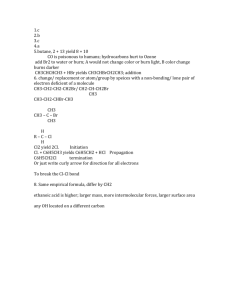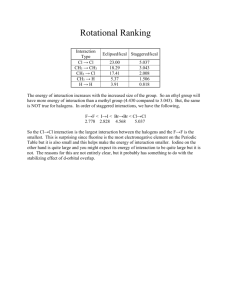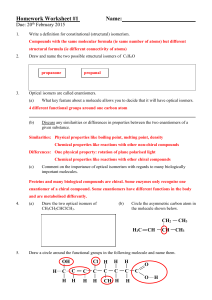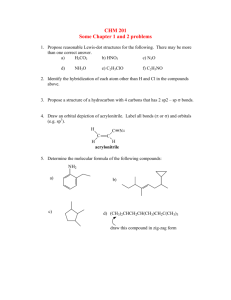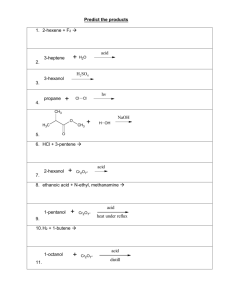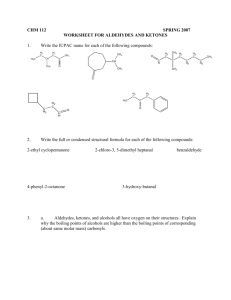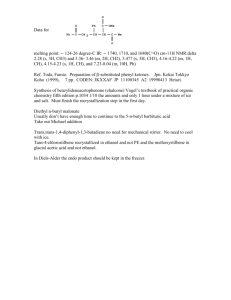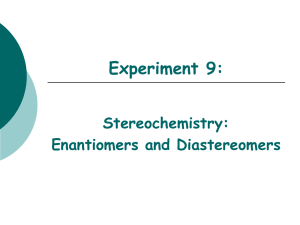Chapter 9: Stereochemistry
advertisement
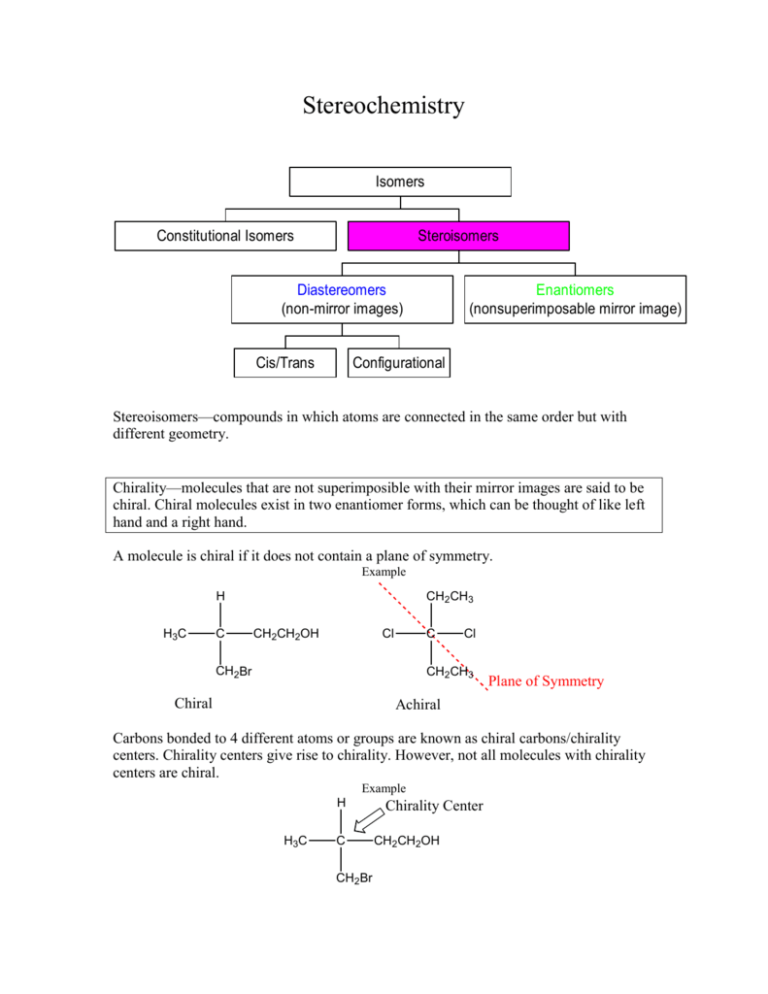
Stereochemistry Isomers Constitutional Isomers Steroisomers Diastereomers (non-mirror images) Cis/Trans Enantiomers (nonsuperimposable mirror image) Configurational Stereoisomers—compounds in which atoms are connected in the same order but with different geometry. Chirality—molecules that are not superimposible with their mirror images are said to be chiral. Chiral molecules exist in two enantiomer forms, which can be thought of like left hand and a right hand. A molecule is chiral if it does not contain a plane of symmetry. Example CH2CH3 H H3C C CH2CH2OH Cl C CH2Br Cl CH2CH3 Chiral Plane of Symmetry Achiral Carbons bonded to 4 different atoms or groups are known as chiral carbons/chirality centers. Chirality centers give rise to chirality. However, not all molecules with chirality centers are chiral. Example H H3C C CH2Br Chirality Center CH2CH2OH Chiral carbons are often indicated with an *. Example H H3C C* CH2CH2OH CH2Br Optical Activity Plane polarized light—light that is passed through a polarizer so that it only oscillates in a single plane. When a beam of plane polarized light passes through a solution of certain organic molecules, the plane is rotated. Molecules that cause the plane to rotate are called Optically Active. Chiral molecules are optically active. The amount of rotation, written as α, can be calculated using a polarimeter and is given in degrees. • Molecules that rotate the plane of polarized light to the left (counterclockwise) are levorotatory (-). • Molecules that rotate the plane of polarized light to the right (clockwise) are dextrorotary (+). Specific Rotation [α]D—the observed rotation when the sample pathlength l is 1 dm, the sample concentration C is 1 g/mL, and the light’s wavelength used is 589 nm. [α]D = Observerd Rotation (degrees) pathlength, l (dm) x concentration, C (g/mL) = α l x C Practice Problem 1) Morphine has a specific rotation of –132. If a lab student uses a sample that has a concentration of .0128 g/mL and a path length of 1 dm, what would she expect the observed rotation to be? Answer Enantiomers Enantiomers are superimposable mirror images Examples 1) CH3 H HO * * CH3 OH * HO H * H Cl H OH Cl 2) COOH OH (S) (R) H H CH3 CH3 HO HOOC Enantiomers have the same physical properties and spectroscopic properties. They are identical in all respects except in how they affect plane polarized light. Diastereomers Molecules with more than one chiral carbon can exist not only as enantiomers, but also as diastereomers, another type of stereoisomer. Diastereomers are non-superimposable non-mirror images Example CH3 H HO * * Cl CH3 OH HO H HO * * H H Cl The maximum number of stereoisomers a molecule can exist as is equal to 2 n+m, where n is the number of chiral carbons and m is the number of double bonds (primarily carboncarbon double bonds). Practice Problem 2) What is the maximum number of stereoisomers for: Br H CH3 HO CH3 Cl Answer R, S Configuration 1) Assign priorities to each of the four atoms directly bonded to the chiral center with 1 being the highest and 4 the lowest. The atom with the highest atomic number is given first priority, as with E,Z designation. 2) If a decision about priority cannot be made by looking at the atoms bonded directly to the chiral carbon, consider the second atom in the substiuent, comparing each substituent atom by atom until a difference can be found. 3) Multiple-bonded atoms should be counted as having the same number of singlebonded atoms. 4) View the molecule so that the lowest priority atom is in the back. • • The chiral carbon is R if the first priority to third priority atoms are arranged in a clockwise direction. The chiral carbon is S if the first priority to third priority atoms are arranged in a counterclockwise direction. Example: COOH OH and H HO CH3 H HOOC CH3 Assign Priorities 2 COOH 4 OH 1 4 H HO1 CH3 3 H HOOC CH3 3 2 These enantiomers are drawn such that the lowest priority atom is in the front. It is coming towards you. In order to determine which is R or S you must either 1) imagine yourself to be standing behind the molecules looking out (so that the hydrogen is in the back), or 2) you can simply reverse whatever answer you would get from viewing the molecule as it is with the lowest priority atom in the front. For instance, the left molecule has the first to third priorities arranged clockwise, which would be an R if the hydrogen were in the back. However, since the lowest priority atom is in the front, reverse this answer to an S. By the same reasoning, the molecule on the right is an R. COOH OH (S) H HO (R) CH3 H HOOC CH3 When dealing with molecules with more than one chiral carbon, assess each chiral carbon individually when determining whether it is R or S. Practice Problems 3) Determine the R/S configuration for the following molecules: a. b. OH COOH H3 C H3CH2C H3 C Br H H Answer 4) Which of the following are enantiomers? a. b. Br H3 C HOOC c. COOH Br H H3C COOH H H3 C Br H Answer 5) Label the chiral carbons (indicated by an *) as R or S: CH3 * H * HO CH3 OH HO H HO * * Cl H H Cl Answer Meso Compounds Meso Compounds are compounds that contain chirality centers but are achiral. Example CH3 HO * H Plane of Symmetry HO * CH3 Meso compounds are not optically active. H Racemic Mixtures Racemic Mixtures—A 50:50 mixture of the two enantiomers. Racemic Mixtures give a net rotation of plane polarized light equal to zero. The amount of each enantiomer is equal so that each cancels out the other’s effects on plane polarized light. Fischer Projections Fischer Projections, like Newman Projections, are a way to represent the three dimensional arrangement of molecules. A Fischer Projection, representing a tetrahedral carbon consists of 2 crossed lines. Example COOH COOH (S) (S) HO H HO • • H CH3 CH3 Horizontal lines represent bonds coming out of the page. Vertical lines represent bonds going into the page. To determine a molecules R or S configuration from a Fischer Projection, move the lowest priority atom to the top position, following the rules for movement listed below, before assessing whether the three highest priorities are in a clockwise (R) or counterclockwise (S) direction. Allowable Moves: 1) Hold one group fixed and rotate the other three in a clockwise or counterclockwise direction. Example COOH COOH (S) HO H3C H (S) OH H CH3 2) Rotate the projection 180° Example COOH H3C (S) H OH H HO (S) CH3 COOH Practice Problem 6) Assign R/S configurations to the following Fischer Projections: a. CH2CH3 H3C OH H Answer b. CH2CH3 H3C CH2CH2CH3 H Answer Answer 1) Morphine has a specific rotation of –132. If a lab student uses a sample that has a concentration of .0128 g/mL and a path length of 1 dm, what would she expect the observed rotation to be? C = .0128, l = 1, [α]D = - 132 -132 = α 1 x .0128 α = -1.6896 approximately –1.69 Return to Problem Answer 2) What is the maximum number of stereoisomers for: Br H CH3 HO CH3 Cl 2 chiral carbons. 0 double bonds. n = 2, m = 0 2 n+m = 4 Return to Problem Answer 3) Label the following as R or S: A B. OH H3 C H3CH2C A is S COOH H H3 C Br H B is R Return to Problem Answer 4) Which of the following are enantiomers? A B Br H3 C HOOC COOH Br H H3C COOH H Br Br (S) H3 C HOOC C (R) H3 C Br H COOH (R) H3 C H COOH Br H A and B are enantiomers. B and C are the same molecule. Therefore, A and C are also enantiomers. H H3C Return to Problem Answer 5) Label the chiral carbons (indicated with an *) as R or S: CH3 H HO * * CH3 OH HO H HO Cl CH3 CH3 OH H R H S H Cl * HO S HO H Cl S H * HO H Cl Return to Problem Answer 6) Assign R/S configurations to the following Fischer Projections: a. CH2CH3 H3C OH H CH2CH3 (s) H3C OH H Return to Problem Answer 6) Assign R/S configurations to the following Fischer Projections: b. CH2CH3 H3C CH2CH2CH3 H CH2CH3 H3C (s) CH2CH2CH3 H Return to Problem
